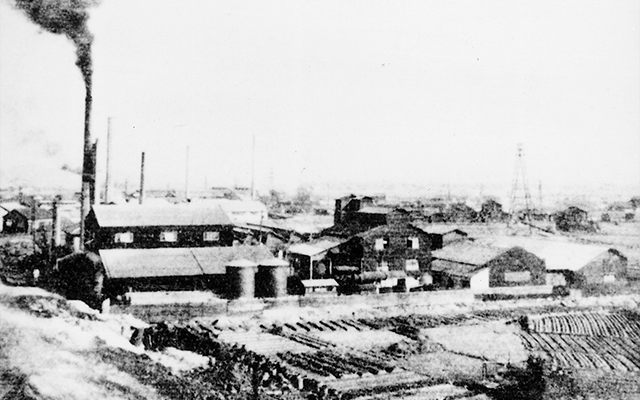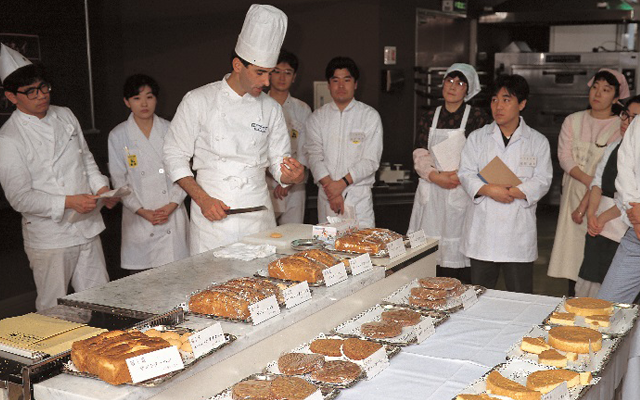The Fuji Oil Group's Path to Developing the Potential of Food Ingredients
Since our founding in 1950, the Fuji Oil Group has sought the happiness and wellbeing of people and the Earth through food. In so doing, we have followed the path of innovation and challenges.
This corner, divided into three chronological sections covering the past to the present, revisits the path we have traversed as we seek to develop the potential of food ingredients in accordance with the Fuji Oil Group Management Philosophy.
1950s-1960s
"Imitation is Not the Way" – Establishing Original Technology
-
1950
Fuji Oil established
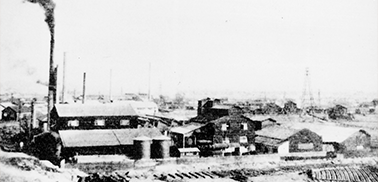
-
Read More
The history of Fuji Oil began in the oil product plant of its predecessor, Fuji Sanshi.
During the period of rationing after WWII, the company found it difficult to procure rations of raw materials for oil and fat. As a result, the company decided to develop products that distinguished itself from other companies and that used different raw materials. Our predecessors embraced the idea that there was no reward in copying others and the importance of fostering uniqueness, no matter how minor. Our journey towards innovation and challenge begins.
-
1951
World’s first oil from pressurized extraction of copra

-
Read More
At the time in Japan, copra had not yet commercialized for use as a food ingredient. However, Fuji Oil focused on it as a raw material due to great expectations for expanded use in food-based applications that could be achieved by taking advantage of its characteristic as a tropical oil that hardened at room temperature.
We were able to achieve uniqueness in our raw materials and technology by becoming the first in the world to successfully establish pressure extraction technology, which involves an initial pressing of copra followed by a secondary processing to extra more oil.
-
1954
Japan’s first palm kernel oil extraction
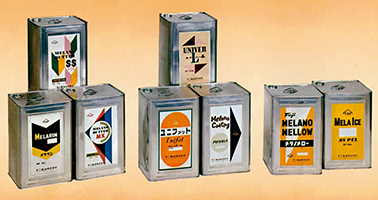
-
Read More
Amid our pursuit of uniqueness under the spirit of "there is no reward in copying others", we focused on palm kernels (the seed at the center of palm fruit) as a raw material, something that had never been done before, to establish the first palm kernel oil extraction technology in Japan.
We began development of hard butter, a substitute oil for cocoa butter, the raw material used to make chocolate.
-
1955
Manufactured Japan’s first hard butter
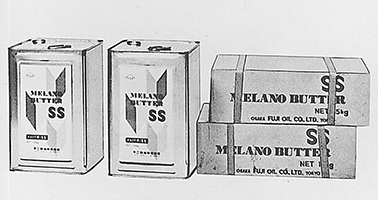
-
Read More
Launched sales of the hard butter "Melano Butter" in 1955. At the time, it was strongly believed that no vegetable fats for chocolate could replace cocoa butter, so there was a strong negative reaction to hard butter.
However, we conducted a sales promotion involving manufacturing our own chocolate to prove the high quality of Melano Butter. This lead to gradual brand recognition. In 1959, "Melano Butter SS", a new, high quality hard butter, was born. Resolve the issue of fat blooming (chocolate turns white in color), one of the weaknesses of cocoa butter. Hard butters continued to gain acceptance as a raw material for chocolate thanks to the ability to adjust the melting point to suit the seasonal temperatures.
-
1960
Published Basic Management Principles
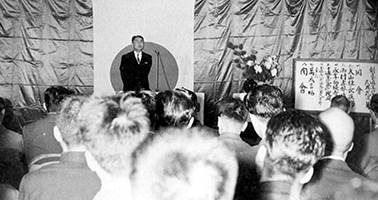
-
Read More
To mark our 10th anniversary, then senior executive manager Masataro Nishimura (who would go on to become the 2nd president of Fuji Oil), created the Fuji Oil Basic Management Principles as a charter for management.
In 1981, this was revised to further clarify purpose and simplify language. Asserted the fundamental philosophy of "achieving ceaseless growth by accomplishing customer satisfaction", "challenging innovation continuously with a spirit of creativity", and "enriching individual character through vigorous self-enlightenment."
-
1961
Started using defatted soybean protein
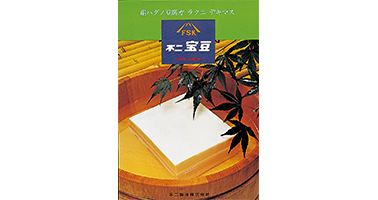
-
Read More
With the deregulation of soybean imports in 1961, oil companies began releasing products, including breads, biscuits, and noodles, using defatted soybeans.
However, Fuji Oil's vision was to focus on developing high-protein soybean meal, so we remained dedicated to our policy of improving quality by using soybean replacements or using soybeans as a raw material, and stayed committed to our R&D efforts.
The result was the development of "Fuji Takaramame" in 1961. This was a defatted soy protein product that served as a raw material for miso fermentation, tofu, fried tofu, and more. Not only did this product improve work efficiency at tofu shops, it also contributed to improving the functionality and quality of tofu and fried tofu as final products.
-
1963
Developed Japan’s first coating chocolate

-
Read More
At the time, Fuji Oil was challenging itself to extract cocoa butter from the cacao powder using to make cocoa drinks.
It was during this process that we discovered the key to developing chocolate for coating. In 1963, we released Choco Fancy, a coating chocolate that was made by combining with hard butter. We also launched sales of Choco Fancy for confectioneries and ice cream.
At the time, milk chocolate was the main type of chocolate sold but Choco Fancy was unique for its black color and shiny gloss. At first, consumers were wary of the black color but they did find the gloss appealing. It was after this that black-colored coating chocolate became common. Later, it would be used in the manufacturing of a wide variety of products, including biscuits, confectioneries, and breads.
-
1966
Established gel forming soy protein manufacturing method, acquired patents in 10 countries

-
Read More
As the use of defatted soybeans advanced, we established a gel molding method for soy protein isolate, which has a high protein content. Secured patents in ten countries.
In 1966, we launched sales of Fujipro, a product with superior viscoelasticity and emulsifiability. Helped develop a new market for soy protein isolate as an ingredient for improving the function and quality of sausage and other processed foods.
-
1968
World’s first sterile filling production for high-fat cream
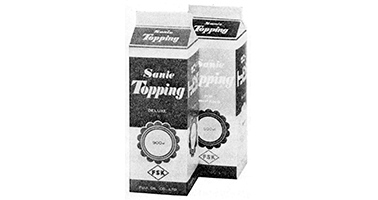
-
Read More
As Japanese continued to adopt more western diets, preferences began to shift from traditional snacks and Japanese confections to cakes.
However, due to fresh cream quality being unstable due to the nature of milk fat, there was the problem of these products having a short shelf life. We focused on this issue and aimed to create a whipped cream that was both delicious and long-lasting. We succeeded in developing a cream made from a plant-based oil. As a result, we launched sales of the whipped cream Topping in 1968. Previously, cream products were only available from stores within same-day delivery distance of the production factor. However, this product made whipped cream available to stores around Japan. Butter cream had been the main method of decorating western confections but this development created the significant opportunity for consumers to switch to a whipped-cream by topping.
-
1969
Engaged in margarine business
1970s-1990s
Contributions to Diversified Japanese Food and Global Expansion
-
1971
Started operations at Hannan Plant

-
Read More
Constructed the Hannan Plant (Izumisano, Osaka) as a large-scale shorefront plant with the goal of establishing an international food company through scope expansion and optimization.
A major issue was pollution prevention measures. We implemented thorough pollution prevention measures, including installing an internal power generator, ensuring wastewater treatment, installing a powered dust collector to prevent air pollution, and installing activated sludge treatment facilities.
-
1977
Opened Fuji Sunny Plaza Tokyo
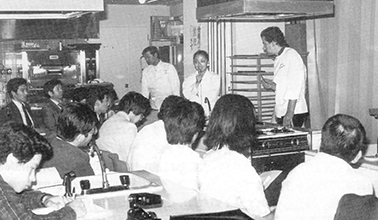
-
Read More
The 1970s marked Japan‘s emergence as a mature society and advanced growth. With a focus on discovering changes in people’s needs and preferences, and increasing communication with our customers, we decided to establish a new facilities to jointly develop products with our customers.
Based on the concept of being a place for creating the future of food, in 1977 we established Fuji Sunny Plaza Tokyo, the first Fuji Sunny Plaza facility.
-
1978
Listed on the First Section of the Tokyo Stock Exchange
-
1980
Started Japan’s first sales of plant-based cheese ingredients
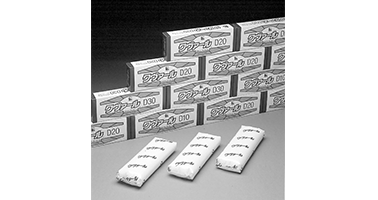
-
Read More
Cheese cake from France was introduced to the Japanese western confectionery industry but confectionery shops faced the problem of not being able to obtain the all-important cheese for cake baking due to issues related to production capacity and transport.
Our company had previously been working on research to develop a cheese-flavored ingredient. We accelerated this research and added other technologies such as emulsified fermentation to successfully develop Japan's first plant-based cheese-flavored ingredient (a filled cheese made by using fat-free milk solids, replacing milk fat with plant fat, and fermentation). In 1980, we launched sales under the product name Quvearl and later enhanced the product lineup. In addition to confections and breads, the product gained popularity as a new ingredient for use in desserts and frozen confectionery.
Established enzymatic interesterification technology

-
Read More
With full-scale bio research underway, we began research into fermentation technology and enzyme utilization technology.
In 1980, we established enzymatic interesterification technology.
This technology enabled the world's first production of vegetable fats for chocolate using sunflower oil.
-
1981
Established FUJI OIL (SINGAPORE)

-
Read More
We first engaged in overseas markets by establishing extraction plants in Malaysia in 1973 and the Philippines in 1974. However, we faced the realities of overseas expansion when trying to deal with local investments and national policy, and were forced to withdraw from those businesses.
In 1981, we established FUJI OIL (SINGAPORE) as a core plant for conducting product exports out of a central Asian market to markets around the globe.
After expanding into Malaysia in 1986, the United States in 1987 and Belgium in 1992, Fuji Oil embarked upon a path on the world stage, seeking to develop the potential of food ingredients.
-
1988
Tiramisu boom driven by cheese-flavored ingredient Mascapone

-
Read More
Fuji Oil employees who learned about Italy's tiramisu during a research trip to Europe saw the possibility of expanding tiramisu to Japan, where it was virtually unknown.
Fuji Oil started development of a plant-based fermented lactic acid ingredient to serve as a substitute for mascarpone, the main ingredient in tiramisu. We succeeded in creating "Mascapone" comparable to conventional mascarpone in terms of shelf life, workability, quality stability, and price, and launched sales in 1988. With growing popularity among young women, a feature published in a trend magazine at the forefront of pop culture resulted in an almost overnight boom in popularity. Tiramisu grew to become a revolutionary product that changed the landscape of the dessert scene and also caused a dramatic rise in orders for our Mascapone.
Fuji Oil's role in developing a hit product so popular that the phrase "tiramisu effect" was coined helped garner attention within the confectionery industry for our concept proposal capabilities. This also made us aware of the importance of product proposals and sales.
-
1989
Established revolutionary product to prevent chocolate blooming

-
Read More
Chocolate made from cocoa butter requires a tempering (heat adjustment) process to prevent fat blooming.
In 1989, we used our cumulative knowhow from fundamental research in fats and oils to transesterification technology to develop Chocoseed. Adding this seed agent to chocolate raw materials makes it possible to omit the tempering process and reduce chocolate manufacturing times. In addition to the benefit of not experiencing fat blooming after melting and rehardening, the workability of the chocolate is also improved. This expanded application to include chocolate that is frozen and eaten, and chocolate that combines baked confections with bread.
-
1993
Completed soluble soy polysaccharides production technology
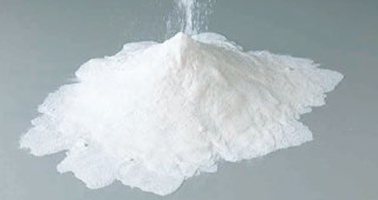
-
Read More
Soluble soy polysaccharides are a unique ingredient that enables the advanced use of okara (soybean meal). They can be used as a stabilizer that prevents sedimentation in lactic acid beverages, and are widely used by the beverage industry. They are also used as a noodle loosening agent and for improving the workability of rice, resulting in broadbased use in the lunch boxes and other food sold in convenience stores. Today, soluble soy polysaccharides have grown to become a mainstay business that represents an income pillar in our Soy-based ingredients business.
2000s-
Aspirations to Be a Global Company Contributing to the Happiness and Wellbeing of People and the Earth
-
2004
Joined the Roundtable on Sustainable Palm Oil (RSPO)

-
Read More
Palm oil is extracted from plants that grow in tropical regions such as Southeast Asia, and is the most widely used oil in the world. Palm oil is an important raw material for our company, but there are concerns about deforestation due to plantation development, and human rights violations such as forced labor and child labor. The Roundtable on Sustainable Palm Oil (RSPO) was established in 2004, and Fuji Oil joined the same year. This was the turning point for us to start working towards building a sustainable palm oil supply chain.
-
2007
Established low trans fatty acid by using interesterification technology
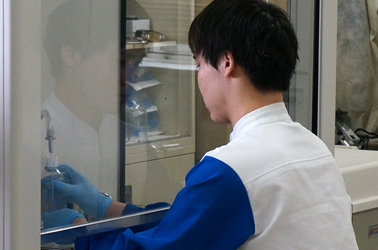
-
Read More
Recent research has shown that excessive consumption of trans fatty acids contained in products such as margarine leads to increased levels of bad cholesterol and increase the risk of heart disease.
Fuji Oil established low trans fatty acid technology in 2007, putting us in the position to rapidly respond to the growing need for low trans fatty acid in America and other markets around the world. This technology enables the production of foods that are not only delicious, but also that greatly reduce trans fatty acid levels, helping us deliver safe, healthy foods to consumers.
-
2010
Developed production technology with flavor enhancement functions

-
Read More
In 2010, we developed the DTR manufacturing method for creating oils and fats with enhanced flavor that highlight saltiness, spiciness, and acidity despite using lower amounts of salt and seasonings.
In 2011, we launched sales of "DTR technology oil series“, which made it possible to reduce the amount of salt and seasoning used in prepared and processed foods.
-
2012
Developed world’s first USS manufacturing method

-
Read More
Fuji Oil has been proactively involved in technology development of soybean. In light of future environmental and resource issues, we want to address future environmental and resource issues by returning to the origins of soybeans and creating new value. In order to contribute to the happiness and wellbeing of people and the Earth through the power of soybeans, we have looked at soybeans from all facets and worked persistently to develop this technology.
In 2012, we succeeded in using our USS (Ultra Soy Separation) manufacturing method, the world's first patent manufacturing method, to develop soy cream and low-fat soy milk as new soybean ingredients. Soy cream and low-fat soy milk are made by separating soybeans in a similar method to that used to separate raw milk, and have a taste and functionality that is not found in conventional soy milk.
-
2015
Opening of first offshore research & development center

-
Read More
Fuji Oil opened the Asia R&D Center, the company‘s first offshore research & development facility in Singapore to provide solutions that are tailored to the needs of our customers.
Grouped Harald, a major Brazilian industrial chocolate manufacturer

-
Read More
In 2015, Fuji Oil purchased shares in Harald, one of Brazil's largest industrial chocolate companies. This move marked a major step into global expansion for our chocolate business.
In addition to the brands and sales channels that Harald has, we aim to expand a new chocolate culture in the South American region by developing high-quality, high-function chocolate products that make use of our oil and fat technology.
Switched to group company structure
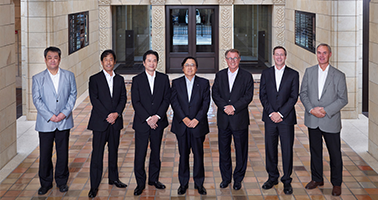
-
Read More
With the aim of localizing business operations and improving speed, we transitioned to a group headquarters system (pure holding company system) and accelerated business development in each area.
We began building a management foundation for sustainability and governance, while accelerating M&A as a pillar of growth in overseas development.
Established the Fuji Oil Group Management Philosophy

-
Read More
We have formulated the Fuji Oil Group Management Philosophy as a basis for sharing the values of all employees of the Fuji Oil Group and for prioritizing our decisions and actions.
In addition to carrying on our founding spirit, the Fuji Oil Group Management Philosophy outlines our Group mission, our ideal structure, and the values and ethics we must adhere to in our business activities.
The mission outlined in the Fuji Oil Group Management Philosophy (Our Mission) is to seek to develop the potential of food ingredients and contribute to the happiness and well-being of the people by offering delicious and healthy food.
All our Group employees are united in our commitment to happiness for people and communities as we work to resolve social issues.
-
2016
Development DHA/EPA stabilization technology

-
Read More
DHA and EPA are mainly found in fish oils, and consumption are believed to help prevent lifestyle diseases, heart disease, dementia, and other illnesses.
On the other hand, DHA and EPA oxidize quickly compared to other oils, and with deterioration due to oxidation, DHA and EPA the release a distinctive "fish smell, and their use in general foods is considered difficult.
We have continued R&D based on the theme of health oils and fats, and in 2016, we successfully developed the world's first "stable DHA and EPA", which dramatically reduces deterioration due to oxidation. The dissemination of foods containing stabilized DHA and EPA will enable the delicious and easy consumption DHA and EPA, levels of which are typically insufficient in the diets of most people.
Formulated Responsible Palm Oil Sourcing Policy
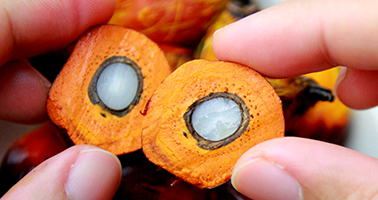
-
Read More
We formulated and announced Responsible Palm Oil Sourcing Policy as an approach to to be adopted by the entire Fuji Oil Group. This policy promises the procurement of palm oil produced by responsible methods from suppliers who respect human rights and the environment. We work with stakeholders to ensure procurement in line with this policy. We continue to promote responsible palm oil procurement so that palm oil is accepted worldwide as a sustainable raw material for oils and fats.
Opening of the Fuji Science and Innovation Center

-
Read More
With the transition to a group headquarters system in 2015, the center of our leap to a new stage was the establishment of this facility as a place for spurring innovation through the combination of knowledge and technology originating from both Fuji Oil and elsewhere.
By serving as the headquarters of the group's global network for research and technological development to identify the needs of the world's markets and contributing to society with delicious and healthy food, we seek to fulfill our vision by creating the future of delicious and healthy foods.
-
2017
Formulation of the Fuji Oil Group Human Rights Policy
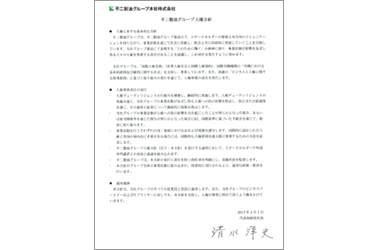
-
Read More
While maintaining interactive communication with stakeholders, Fuji Oil Group seeks sustainable development in harmony with society by contributing to society through our business.
On April 1, 2017, we formulated the Fuji Oil Group Human Rights Policy in accordance with "work for people," the value declared in the Fuji Oil Group Management Philosophy.
Establishment of UNIFUJI
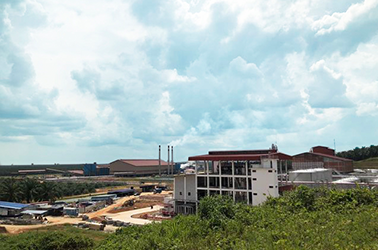
-
Read More
We established a joint venture company, UNIFUJI, in Malaysia to produce and sell high-value-added palm oil products made from sustainable palm oil as a raw material.
Based on our “Responsible Palm Oil Sourcing Policy” we promote the procurement of palm oil produced in a responsible method from suppliers who respect people and the global environment.
-
2018
Formulation of Responsible Cocoa Beans Sourcing Policy
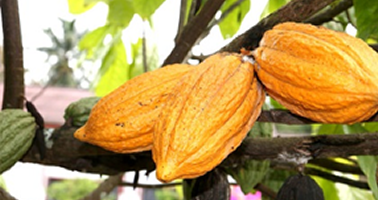
-
Read More
Cocoa is an important raw ingredient for the Fuji Oil Group.
We formulated Fuji Oil Group Responsible Cocoa Beans Sourcing Policy to continue delivering happiness through foods on into the future through products made with sustainable cocoa.
In accordance with this policy, we are committed to working with a wide range of stakeholders in the cocoa supply chain as we source sustainably grown cocoa throughout our business.
-
2019
Grouped Bloomer Chocolate Company

-
Read More
In 2019, Fuji Oil grouped Blommer Chocolate Company, one of the largest industrial chocolate company in America.
Blommer was established in Chicago in 1939. Blommer is the largest processed cocoa products and second-largest industrial chocolate company in North America. Blommer has an intimate relationship customer, a consistent R&D capability from beans to final product, and strong in initiatives for sustainability.
With the addition of Blommer, Fuji Oil Group is increased presence in Pacific Rim market and the U.S. market. This is a union in which the two companies’ strengths and knowledge complement each other perfectly, including business areas, business regions, customer networks and sustainability of main raw materials. Our mutually complementary strengths will drive business across the Group.
Support of the recommendations of the Task Force on Climate-related Financial Disclosure (TCFD)

-
Read More
Fuji Oil hereby announces its support of the recommendations of the Task Force on Climate-related Financial Disclosure (TCFD). In order to achieve a sustainable society and ensure the sustainable growth of our company, adaptation to and mitigation of climate change are important issues. We will analyze the risks and opportunities that climate change poses to our business, and promote responses and information disclosure.
-
2020
Received the highest rating in the fields of forests, climate change, and water security from CDP

-
Read More
We have been selected as an “A List Company” by the international environmental nonprofit organization CDP, having received the highest rating in the fields of forests, climate change, and water security.
Through significant demonstrable actions on climate change, deforestation and water security, Fuji Oil is leading on corporate environmental ambition, action and transparency worldwide.
-
2021
Developed a technology brand MIRACORE™, makes plant-based foods more delicious

-
Read More
We developed a technology MIRACORE™, which combines plant-based oils/fats and proteins to create the sensation of satisfaction that enables the realization of a future in which people can enjoy choosing plant-based foods. It is a technology that came to fruition thanks to Fuji Oil and is rooted in the company’s more than 70 years of research into plant-based oils, fats and proteins. We will provide solutions that bring out the deliciousness of plant-based foods even more.
Formulation of Supplier Code of Conduct

-
Read More
For us, suppliers are important partners in the realization of a sustainable society. Through co-creation with suppliers, we aim for sustainable development for the three parties of “suppliers”, “Fuji Oil Group”, and “society”.
Fuji Oil formulated Supplier Code of Conduct. This Code of Conduct will enable us to continue communicating and engaging with suppliers, to ensure that the products and services we procure have been produced and handled in a resilient and responsible way, respecting the environment and human rights.
-
2022
Transition to a Company with an Audit and Supervisory Committee
-
Read More
To further strengthen corporate governance, we transitioned to a company with an Audit and Supervisory Committee. By including Audit and Supervisory Committee Members, who audit the execution of duties by Directors, in the Board of Directors, we aim to enhance the transparency and objectivity of management, and improve the effectiveness of the Board of Directors.
Launched the GOODNOON brand

-
Read More
We launched GOODNOON brand as our flagship to realize our vision, “Together with our stakeholders, we will co-create a sustainable future for food, based on plant-based
ingredients that are both delicious and healthy.”
By pursuing the potential of plant-based foods, we seek to improve the well-being of people and the Earth, increase food options, and create a new food standard that will enable everyone to enjoy their meals from the heart.
Developed a new production method for soy meat, “Prime Texture Manufacturing Method”

-
Read More
The Prime Texture manufacturing method applies the soybean and oil processing technology that Fuji Oil has cultivated over many years, and has achieved both a meat-like chew and a melt-in-your-mouth texture, which until now was considered difficult.
In 2022, we began selling a new type of soy meat called “Prime Soy Meat” that uses this manufacturing method.
-
-
2023
Established of Fuji Oil Group Policy on biodiversity

-
Read More
Fuji Oil established a Fuji Oil Group Policy on Biodiversity for initiatives aimed at the conservation and restoration of biodiversity and to make contributions to the realization of a society that can co-exist with nature. Our Group’s business is both supported by and has an effect on the blessings of our abundant natural ecosystem. Moving forward, we will continue to engage in maintaining biodiversity as one of our important management issues, and will make contributions to the realization of a society that co-exists with nature.
Revised the vision of “Fuji Oil Group Management Philosophy”

-
Read More
Fuji Oil has revised the vision of Fuji Oil Group Management Philosophy to “Together with our stakeholders, we will co-create a sustainable future for food, based on plant-based ingredients that are both delicious and healthy.”
A complex supply chain and many stakeholders are involved in the process of food reaching consumers. In order to solve social issues related to food, it is important to work on this throughout the entire value chain, including consumers as well as individual companies. Fuji Oil plays a role in the middle of the food value chain, and through research and development and production activities, we strive to provide solutions to the problems faced by our customers and the consumers who use their products.
-
2024
Establishment of joint venture company, JPG Fuji Sdn Bhd

-
Read More
Our Group companies FUJI OIL ASIA PTE. LTD. (Singapore) and Johor Plantations Group Berhad (Malaysia), a palm oil and palm kernel manufacturing company, have jointly established a joint venture company, JPG Fuji Sdn Bhd.
This joint venture company will secure high quality, traceable, and sustainable raw material palm oil from a well-managed plantation owned by Johor Plantations. It will produce and sell high value added palm oil products at a newly built refinery plant in the plantation by utilizing biomass and wastewater to produce energy. It is scheduled to begin operations in 2026.
